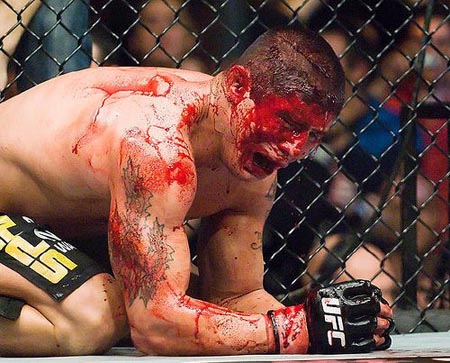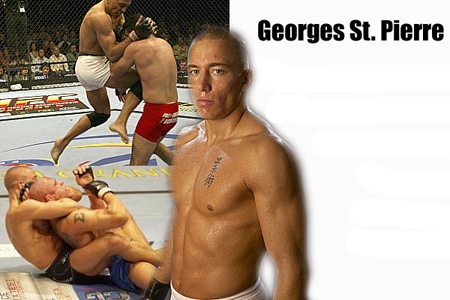Wrestling / Mixed Martial Arts |
 Okay, I'll be honest. I got into Mixed Martial Arts (MMA) because I thought it would be hot to see two half-naked sweaty muscular guys beat the snot out of each other. And it is. But the more I watched, the more I came to understand what the sport is all about, and the more I came to appreciate it for the athletic competition that it is. People tend to equate Ultimate Fighting with Professional Wrestling. There are many, many differences. Professional Wrestling is performance, not competition. People always describe it as "fake." In truth the outcome is always predetermined, the strikes are mostly simulated, and the throws are designed to be visually spectacular but not actually impart any real damage. But it's not entirely fair to say that it's fake. These are highly skilled athletes doing some pretty amazing things. I equate it more to acrobatics than sport. It's fake in the same way that the circus is fake.
Another significant difference between Ultimate Fighting and Professional Wrestling is that the latter is as much about the spectacle and the posturing as it is the actual bouts. The participants create bigger-than-life characters with outlandish themes, and they're always shouting, and threatening one another. MMA fighters have been known to talk a lot of smack in interviews, which often leads to bitter rivalries, but it's not a ridiculous, scripted, over-the-top production that overshadows the actual competition. MMA is absolutely 100% real. It is a true, authentic, sporting competition in every sense of the word. In the early days there were very few rules, and it was positively brutal. It was equated to human cock fighting, and at the time that description wasn't too inaccurate. Even the term "cage fighting" implies that the opponents are held captive and coerced into fighting. It's regrettable that the sport had this ignominious beginning that has stuck with it ever since, because it's come a long, long way since then. Today it is fully accredited and regulated in the same way that boxing is. There are designated weight classes, stringent rules that are designed to keep anyone from getting too badly injured, and the referees keep close control of the action at all times. There are a few ways a fight can end:
Ultimate Fighting still has the reputation of being very violent. It's difficult to refute that, but here's the way I see it. I consider violence as something that is inflicted by one party onto another, violating the victim in the process. In MMA, there are two consenting participants who know exactly what they're getting themselves into, and they do it willingly and eagerly. There's a lot of hitting and kicking and wrenching of limbs, and sometimes even some blood, but that's just comes with the territory. Most of the fighters, interestingly, enjoy getting beat up as much as they enjoy beating up their opponents. Generally it looks a lot worse than it is. Take the picture at the top of this page, for example. The fighter looks absolutely wretched. The truth of the matter is that he got a cut at his hair line that bled profusely but didn't actually do him any harm, and the photographer caught him fatigued and panting at the end of a round. He was not wailing in agony and defeat like the picture makes it appear. He was perfectly fine, and enthusiastic, even insistent, about continuing on to the next round. I must confess, though, that I love it when a fight gets bloody. I abhor victim violence, but I'm still captivated by the sight of crimson blood. This gives me an opportunity to see it gushing all over the place, but in a situation and context where the individual who is bleeding is well looked after, takes ownership of his own bleeding, and will be just fine. To me it is a graphic ode to the resilient nature of a strong, fit, healthy human body. In fact that has much to do with the allure of the sport to me in general. These men do take serious beatings, but they get right back up and soldier on. It is a tribute to and exhibition of the level of scathe that the human body can endure and triumph over. Occasionally someone will suffer an injury that is a little more serious. Generally it's commensurate with the kind of sporting injuries you'll see in football, hockey, or other rough contact sports. The truth is that's pretty rare in MMA, and usually comes about because a fighter got caught in a submission and deliberately and stubbornly refused to tap out. Even someone who gets knocked out cold, or choked unconscious, will usually be back on his feet congratulating the victor just a minute or two later. As the name implies, MMA takes a wide variety of martial arts, and mixes them all together into one multidisciplinary sport. Different fighters have different strengths and weaknesses, but to succeed you need to be well-rounded, and excell in all areas. These most prevalent martial arts include:
|
 |
|
My favorite fighter is George St. Pierre. There are many reasons for this. First of all, he's hot as hell. He's handsome, with a masculine cropped haircut, great proportions, and a beautiful, lean musculature. I also like the fact that he's my height (although he does have an additional 20 pounds of pure muscle). The fact that he's French Canadian out of Montréal is appealing to me. It makes him a little exotic but still close to home. I also like his attitude. He's confident but without being cocky, arrogant, or an obnoxious bully. He's level-headed and well-mannered, and while he doesn't take any shit from his opponents, he doesn't lower himself to the kind of smack-talking that so many other UFC fighters do.
But finally I like him because he's absolutely the best at what he does. When he started fighting in the UFC he consistently trounced much more experienced and highly rated opponents. He always came into his fights as the underdog, and invariably defeated his opponents handily and decisively. His first title fight was against the mid-western, corn-fed, bible-thumping Matt Hughes. George was a little star-struck, and for the first time maybe a little intimidated. As the bout got underway he was actually winning the fight, but in the final seconds of the first round, Matt Hughes caught him out in a submission and he had to tap out. Just another second or two and he would have been saved by the bell, and perhaps gone on to win the fight. The was the first loss of his professional career. Because it was a title fight to the reigning champ, he took it well. It only made him more hungry. He bounced back quickly, defeating some tough competition, and before long had another chance at the belt. This time George was much more experienced, better prepared, and no longer intimidated or start struck. He man-handled Hughes pretty well through the first round, and kicked him in the head early in the second. That sent Hughes to the canvas, St. Pierre pounced, and within seconds the fight was over and George was the new champion. That was one of my most exhuberent moments as a spactator of any sport. For his first title defense he was to breeze through Matt Serra, a has-been roughian from Long Island who won the opportunity at the title by winning the Ultimate Fighter reality show "Comeback" season. The truth was I kind of liked Serra, but up against my favorite fighter St. Pierre I had to root against him. But it was a moot point. He didn't stand a chance, anyway. No one gave him any credibility, including St. Pierre. It was a classic mistake, to underestimate his opponent. Things can change very quickly in MMA. All it takes is one solid punch and a fight can be over. And that was exactly what Serra landed. Despite the fact that he never put together much of a career, Serra did have knock-out power, and he caught St. Pierre right on the button. It was a blow from which he couldn't recover, and within seconds Serra had won the fight and the world championship title. George St. Pierre was stunned, along with the rest of the world. Unlike his only other loss, to then world champion Matt Hughes, this devastated St. Pierre. It absolutely devasted him. But like a true champion, he used it to motivate him. He would say later that this loss was the best thing that ever happened to his career, because it totally changed the way he trained and prepared for fights. He took it much more seriously than he ever had before. He became a training machine. His cardio conditioning was second to none, and his fighting skills became world-class. St. Pierre had a quick route back to another shot at the championship. He first had to face reality show contestent Josh Koscheck. It was a tough fight to bounce back with. Koscheck wasn't a champion contender, but he was a very tough fighter, and a world-class wrestler. He was considered perhaps the best wrestler in the sport. This was not a gimme for St. Pierre. But he wound up out-wrestling Koscheck, demonstrating the degree to which his skills had improved, and took a unanymous decision. Next he had to make his way past former champion Matt Hughes. He blew through him like a Summer breeze. It was a good fight, but St. Pierre was in control from the start, and in truth Hughes never stood a chance. Just a few months before he had been world champion, but now St. Pierre had him totall out-classed. Then it was time to face Serra again. I was absolutely salivating as the fight began. St. Pierre didn't give him another opportunity to use his knockout power. George took him down within the first seconds of the fight, and he kept him on the ground and punished him for the whole of the first round. By the start of the second round, Serra already appeared defeated, but he's a tough scrapper, and he wasn't going to give up. St. Pierre continued to take him down at will, and basically brutalized him. At one point St. Pierre had Serra on his back and was pounding him in the face. Serra rolled over to stop the barrage, so St. Pierre began kneeing him in the ribs. Unable to take that either, Serra rolled back over to his back, and St. Pierre started pounding his face again. So Serra rolled back over again, and St. Pierre went back to kneeing him in the ribs. This cycled through a couple more times, until St. Pierre was so utterly abusing Serra's rib cage that the referee finally put a stop to it. St. Pierre was once again champion. St. Pierre has barely lost a round since then. He has absolutely dominated his weight class. In trugh they're running out of people to put up against him, because frankly no one can give him a run for his money. On one level it's very gratifying for me as a fan, but by the same token it's a little boring. What's the point of watching a fight (and shelling out top dollar for pay-per-view) if you pretty much know he's going to win ahead of time. But as someone who always winds up rooting for the underdog, it's nice to finally go with a winner. |
|
|